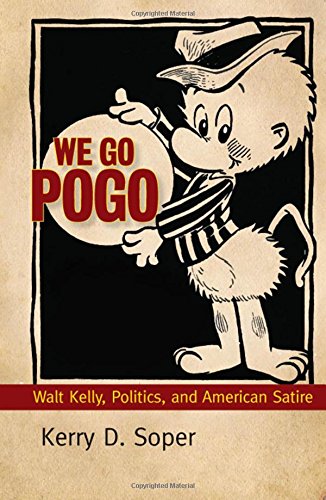

Most ebook files are in PDF format, so you can easily read them using various software such as Foxit Reader or directly on the Google Chrome browser.
Some ebook files are released by publishers in other formats such as .awz, .mobi, .epub, .fb2, etc. You may need to install specific software to read these formats on mobile/PC, such as Calibre.
Please read the tutorial at this link: https://ebookbell.com/faq
We offer FREE conversion to the popular formats you request; however, this may take some time. Therefore, right after payment, please email us, and we will try to provide the service as quickly as possible.
For some exceptional file formats or broken links (if any), please refrain from opening any disputes. Instead, email us first, and we will try to assist within a maximum of 6 hours.
EbookBell Team

4.3
38 reviewsWalt Kelly (1913-1973) is one of the most respected and innovative American cartoonists of the twentieth century. His long-running Pogo newspaper strip has been cited by modern comics artists and scholars as one of the best ever. Cartoonists Bill Watterson (Calvin and Hobbes), Jeff Smith (Bone), and Frank Cho (Liberty Meadows) have all cited Kelly as a major influence on their work. Alongside Uncle Scrooge’s Carl Barks and Krazy Kat’s George Herriman, Kelly is recognized as a genius of “funny animal” comics.
We Go Pogo is the first comprehensive study of Kelly's cartoon art and his larger career in the comics business. Author Kerry D. Soper examines all aspects of Kelly's career---from his high school drawings; his work on such animated Disney movies as Dumbo, Pinocchio, and Fantasia; and his 1930s editorial cartoons for Life, and the New York Herald Tribune. Soper taps Kelly's extensive personal and professional correspondence and interivews with family members, friends, and cartoonists to create a complex portrait of one of the art form's true geniuses.
From Pogo’s inception in 1948 until Kelly’s death, the artist combined remarkable draftsmanship, slapstick humor, fierce social satire, and inventive dialogue and dialects. He used the adventures of his animals―all denizens of the Okefenokee Swamp―as a means to comment on American and international politics and cultural mores. The strip lampooned Senator Joseph McCarthy during the height of McCarthyism, the John Birch Society during the 1960s, Fidel Castro during the Bay of Pigs fiasco, and many others.